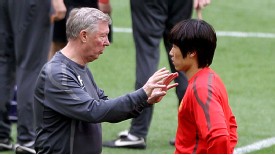Can Asian coaches make their mark in the West?
In 2007, Choi Yon-Kyum, head coach of South Korea’s Daejeon Citizen, went for a drink with his assistant and ended up attacking him with a beer glass. The victim needed 18 stitches. Although the CEO and most fans wanted Choi to stay, he left the K-League club to join the coaching staff at a Turkish club. It provided a rare example of a coach from Asia trying his luck in Europe.
The world’s biggest continent has started sending its players to the West, but tacticians have yet to follow in their footsteps. Asia is not alone in this – apart from the Brazilians and a smattering of other South Americans, coaches from Africa and North America are not exactly flooding Europe. One day this will change, but the questions for Asia are when, how and, of course, who.
Park Ji-Sung recently said that it may take only ten years for an Asian team to win the World Cup, but it may take longer to see Koreans, Japanese or Iranians jabbing fingers in the direction of Sir Alex Ferguson and answering post-match questions from Sky Sports reporters. The timing is not yet right – a quick look around reveals that. When you have many Asian nations preferring to appoint foreign coaches over domestic talent, getting noticed overseas can be next to impossible.
China, currently the most talked about and highest-attended league in the continent, trusts its own coaching stock so little that the new season started with all but three of the 16 clubs in the top-flight in foreign hands. Excited as it was about the new campaign, even the Beijing media found time to fret about the lack of opportunities as well as the money handed to the locals. At the start of the season, Jean Tigana and his staff at Shanghai Shenhua were getting paid around 40 times more than Zhu Jiong and his crew at local rivals Shenxin. Shanghai may showcase the rising economic inequality in China more starkly than any other Chinese city, but this was going too far.
At least Chinese clubs do their bit for Asia, if not the Middle Kingdom, by issuing work visas to a number of Korean coaches – who historically have travelled farther and wider around the continent than their Asian counterparts – as well as the occasional Australian and Japanese boss. That is not the case when it comes to the big clubs in Dubai, Riyadh, Doha and Abu Dhabi. The Arabian giants of West Asia look to Europe and South America as a matter of course. Just two domestic coaches finished the season in the Saudi top-flight, a pattern that is repeated across much of the region.
Even those Asian coaches who have enjoyed success on the global stage struggle for global recognition. In the modern era, only two have taken teams past the first round of the World Cup, but neither Huh Jung-Moo of South Korea and Japan’s Takeshi Okada ever really appeared on the European radar. Adnan Hamad is perhaps the most-respected Asian coach but the Iraqi is even less well-known internationally.
Last summer, ESPN asked Lee Young-Pyo, the South Korean star who used to just teach English in South Korea and has now played for PSV Eindhoven, Tottenham Hotspur, Borussia Dortmund and now Vancouver Whitecaps, if an Asian coach could make it to the big leagues. “At the moment, European footballers don’t want to learn or listen to an Asian coach, but 15 or 20 years later, when Europe accepts that Asian football is strong, it can happen,” Lee said. “For example, at Tottenham, if I talked to youth players and gave them advice, they listened to me, but if I wasn’t playing in the first team, they would never have listened. When we develop more and can teach something to European players then it can change, but not now.”
The export of players to Europe can be the catalyst. This is how to catch the attention of western CEOs, journalists, fans and players. Asian coaches have barriers to overcome but, if they have been successful in Europe as a player, many are removed.
Park Ji-Sung could be the one. Seven seasons and serious success at Manchester United under Ferguson was preceded by over four years with Guus Hiddink at PSV Eindhoven and South Korea. A European, English and Dutch champion, not to mention World Cup semi-finalist, Park, already lauded for his tactical intelligence, would surely have no problem getting the dressing room to listen. Unfortunately, he is…
via Duerden: Can Asian coaches make their mark in the West? – ESPN Soccernet.




